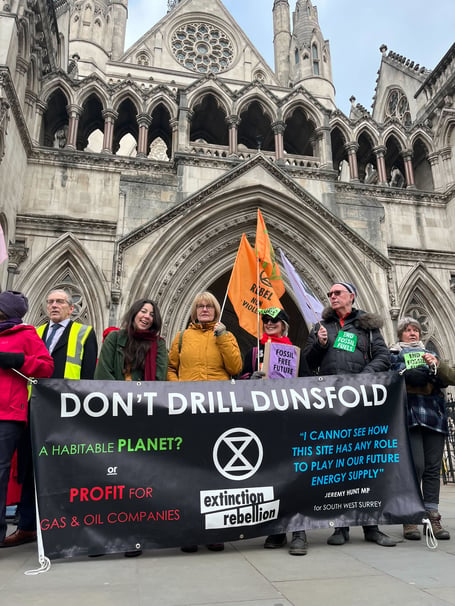Oil protesters are refusing to back down after the High Court ruled in favour of the government’s decision to allow a fossil fuel exploration scheme on the edge of the Surrey Hills Area of Outstanding Natural Beauty (AONB).
Last month, the High Court ruled against a legal challenge brought by the group Protect Dunsfold, over the government’s approval of UK Oil and Gas’ plans to search for gas next to their village.
On the same day MP Stuart Andrew gave the green light to the scheme in Surrey, he refused permission for a similar project in Ellesmere Port because of its greenhouse gas emissions – despite the fact if drilling goes ahead in Surrey, it would produce greater emissions than the rejected plan in Cheshire.
Protect Dunsfold, represented by the law firm Leigh Day and supported by The Good Law Project, is now applying to the Court of Appeal to challenge the High Court’s dismissal of their case.
The campaign group believe that the Minister of State’s decision to approve the plan in Surrey is inconsistent with the reasons given for turning down permission for the project at Ellesmere Port.
The group said if the exploratory drilling goes ahead, it could cause irreversible damage to local wildlife and businesses, and hinder efforts to reach net zero.
Jennine Walker, Legal Manager at Good Law Project, said: “Against the backdrop of the Government’s assault on net zero and its North Sea oil and gas licensing extravaganza, this is a hugely important step from Protect Dunsfold and we are proud to support their application to the Court of Appeal.
“UKOG’s plans to drill the Dunsfold site will see irreparable harm to the natural habitats and landscape on the edge of the Surrey Hills Area of Outstanding Natural Beauty, as well as producing significant amounts of greenhouse gas emissions.
“Success in this appeal will have impacts far beyond the village of Dunsfold and could make it much harder for fossil fuel schemes to go ahead."
Sarah Godwin, director of Protect Dunsfold, said: “There is a glaring inconsistency in the Minister’s decision that greenhouse gas emissions at Ellesmere Port are a material consideration resulting in a decision by him to refuse planning consent whereas the same Minister on the same date ignored virtually the same amount of emissions at Loxley.
“The planet can’t distinguish between greenhouse gases emitted in Cheshire and those emitted in Surrey. As the Climate Change Commission said in a quote referred to by the Minister in the Ellesmere Port case, 'every tonne of carbon contributes towards climate change’.
“Existing Government policies which prioritise oil and gas exploration are an exemplar of institutional climate denial. The recent announcement from the Prime Minister that his Government will ‘max out’ UK’s oil and gas reserves is putting the UK in direct conflict with international experts; low-cost, low-carbon technologies already exist that can supplant fossil fuels. These should always be the core of any national strategy to reach net zero emissions by 2050.
“Protect Dunsfold believes that any fossil fuel exploration project, even on a small scale, is one too many and we will continue to fight to stop UKOG 234 Ltd from putting a spade in the ground at Loxley.”
Leigh Day solicitor Ricardo Gama, representing Protect Dunsfold, said: “Our clients have begun the process appealing the High Court’s worrying decision.
“They believe that there is an important legal principle at stake, which is whether local authorities and the Secretary of State can ignore greenhouse gas emissions when weighing up the public benefits of an exploratory drilling proposal such as this, in a context where greenhouse gas emissions were a reason for refusing a very similar development at Ellesmere Port.”
But James Strachan KC, for the Department for Levelling Up, Housing and Communities, said in June that the campaign group’s argument was “flawed”.
He said: “The fallacy at the heart of Protect Dunsfold’s case is the flawed notion that a planning judgment which involved the weighing of all the relevant considerations to a specific development in one particular location is somehow transferable or applicable to a different development in a different location."





Comments
This article has no comments yet. Be the first to leave a comment.